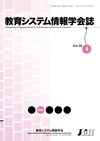Volume 26, Issue 4
Displaying 1-7 of 7 articles from this issue
- |<
- <
- 1
- >
- >|
Preface
-
2009Volume 26Issue 4 Pages 327-328
Published: November 30, 2009
Released on J-STAGE: March 25, 2019
Download PDF (224K)
Original Papers
-
2009Volume 26Issue 4 Pages 329-338
Published: November 30, 2009
Released on J-STAGE: March 25, 2019
Download PDF (1561K) -
2009Volume 26Issue 4 Pages 339-348
Published: November 30, 2009
Released on J-STAGE: March 25, 2019
Download PDF (1972K)
Practical Papers
-
2009Volume 26Issue 4 Pages 349-356
Published: November 30, 2009
Released on J-STAGE: March 25, 2019
Download PDF (1474K) -
2009Volume 26Issue 4 Pages 357-366
Published: November 30, 2009
Released on J-STAGE: March 25, 2019
Download PDF (811K)
Review
-
2009Volume 26Issue 4 Pages 367-376
Published: November 30, 2009
Released on J-STAGE: March 25, 2019
Download PDF (3975K)
Community Plaza
-
2009Volume 26Issue 4 Pages 377-382
Published: November 30, 2009
Released on J-STAGE: March 25, 2019
Download PDF (2293K)
- |<
- <
- 1
- >
- >|
